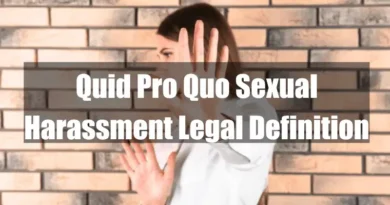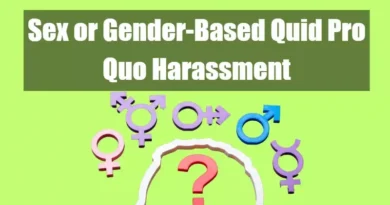Hidden Quid Pro Quo Harassment in Housing
Takeaways
| Key Points |
|---|
| Quid pro quo harassment in housing occurs when a landlord or housing provider demands sexual favors or other inappropriate acts in exchange for housing-related benefits, such as lower rent, repairs, or avoiding eviction. |
| This form of harassment is illegal under the Fair Housing Act (FHA), which protects tenants from discrimination based on sex and other characteristics. |
| For example, a landlord might pressure a tenant to engage in sexual activity in return for approving their rental application or extending their lease. |
| The Department of Housing and Urban Development (HUD) enforces regulations to address both quid pro quo and hostile environment harassment in housing, helping tenants pursue legal remedies when they face such violations. |
Introduction
Quid pro quo harassment in housing occurs when housing providers, such as landlords or property managers, demand sexual favors or other personal acts in exchange for housing-related benefits. These benefits might include favorable lease terms, repairs, or even the opportunity to remain in a rental unit.
This form of harassment violates federal law, specifically the Fair Housing Act (FHA), which prohibits discrimination based on sex, including sexual harassment.

What is Quid Pro Quo Harassment in Housing?
“Quid pro quo, which translates to “this for that,” in the housing context, refers to situations where a housing provider conditions access to housing or housing services on an individual’s submission to unwelcome demands.”
The Department of Housing and Urban Development (HUD) has clarified that even if an individual succumbs to such demands, the harassment is illegal. For example, if a landlord suggests that a tenant perform sexual acts in return for making necessary repairs or avoiding eviction, this constitutes quid pro quo harassment. HUD’s regulations clearly outline that this behavior is prohibited under the FHA.

Legal Framework and Protections
“The Fair Housing Act, enacted in 1968, prohibits discrimination in housing based on race, color, national origin, religion, sex, familial status, or disability.” In 2016, HUD implemented new rules that further clarified the definitions of quid pro quo harassment and hostile environment harassment in housing, strengthening protections for tenants against such abuses.
Sexual harassment can be considered a form of sex discrimination under the Fair Housing Act, as clarified by HUD in 2016, though it was not explicitly named in the original 1968 law.
The rule specifically defines quid pro quo harassment as any unwelcome request or demand to engage in conduct where submission to the request is made a condition for obtaining housing or related services. This could include access to a rental unit, continued residence, or any service like maintenance that a tenant is entitled to under their lease agreement.
How Common is Quid Pro Quo Harassment in Housing?
Sexual harassment in housing is a significant but often underreported issue. Women, particularly those from vulnerable groups such as low-income tenants, undocumented immigrants, or individuals with disabilities, are at higher risk.
Due to the power imbalance between tenants and landlords, many victims fear retaliation or eviction if they report the harassment, leading to an underestimation of its prevalence.” HUD and the Department of Justice (DOJ) have collaborated on initiatives to increase awareness and encourage reporting of such incidents.”
Illustrative Examples
Quid pro quo harassment in housing often takes the form of landlords or housing providers using their power to exploit tenants. For example, a landlord may suggest that they will reduce rent, delay eviction, or speed up necessary repairs only if the tenant agrees to engage in inappropriate conduct. In another scenario, a housing provider might withhold access to essential services, such as plumbing or heating repairs, unless the tenant complies with personal or sexual demands.
These examples illustrate the coercive nature of quid pro quo harassment, where tenants are forced into compromising situations to maintain stable housing or receive the services they are entitled to. Despite legal protections, tenants may feel pressured to submit to these demands because they fear losing their homes or facing retaliation.
Such examples highlight the importance of strong legal frameworks and enforcement to protect tenants, ensuring that access to housing is not contingent on inappropriate or unlawful requests from landlords.

Enforcement and Remedies
Victims of quid pro quo harassment in housing have several avenues for recourse. They can file a complaint with HUD or a local fair housing agency, which will investigate the claim. If the investigation finds sufficient evidence, HUD may bring a case against the housing provider. Alternatively, victims can pursue a private lawsuit in federal or state court.
The penalties for housing providers found guilty of quid pro quo harassment can be severe. They may be required to pay monetary damages to the victims, civil penalties, and undergo mandatory training on fair housing laws. Landlords may sometimes lose their rental licenses or, in rare cases, may face criminal charges depending on the jurisdiction and the severity of the misconduct.
What to Do if You Experience Quid Pro Quo Harassment in Housing
Tenants who experience quid pro quo harassment should document the incidents, including keeping records of communications with the landlord and any witnesses. They can report the harassment to HUD through its website or by calling the Fair Housing hotline. Tenants should not feel pressured to comply with unlawful demands, as these actions are explicitly prohibited under federal law.

Recent Developments and Awareness Campaigns
HUD and the DOJ have increasingly focused on sexual harassment in housing through campaigns aimed at both landlords and tenants. These efforts are designed to raise awareness about the issue and provide resources for victims. HUD has also worked to clarify guidelines for housing providers to help them understand their responsibilities under the law and avoid behaviors that could lead to harassment claims.
“In 2018, HUD and the DOJ launched a national initiative to combat sexual harassment in housing, with a particular emphasis on outreach to vulnerable communities.” This initiative included partnerships with local housing authorities and advocacy groups to ensure that tenants know their rights and landlords understand their obligations under the FHA.
Conclusion
Quid pro quo harassment in housing is an illegal and harmful practice that disproportionately affects vulnerable tenants. The Fair Housing Act and HUD regulations provide clear protections against such harassment, ensuring that no one has to exchange personal favors for basic housing rights.
By understanding their rights and the resources available, tenants can protect themselves from abuse and seek justice if they are harassed.
The efforts by HUD and DOJ, along with increased awareness campaigns, are contributing to a better understanding of quid pro quo harassment and providing more support to those affected, though the overall reduction in occurrences may vary based on local enforcement and advocacy efforts.









